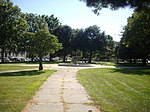United States District Court for the District of Maine

The U.S. District Court for the District of Maine (in case citations, D. Me.) is the U.S. district court for the state of Maine. The District of Maine was one of the original thirteen district courts established by the Judiciary Act of 1789, even though Maine was not a separate state from Massachusetts until 1820. The court is headquartered at the Edward T. Gignoux United States Courthouse in Portland, Maine and has a second courthouse in Bangor, Maine. The U.S. attorney for the District of Maine represents the United States in criminal and civil litigation before the court. As of October 8, 2021 the U.S. attorney is Darcie N. McElwee.Appeals from the District of Maine are heard by the United States Court of Appeals for the First Circuit (except for patent claims and claims against the U.S. government under the Tucker Act, which are appealed to the Federal Circuit).
Excerpt from the Wikipedia article United States District Court for the District of Maine (License: CC BY-SA 3.0, Authors, Images).United States District Court for the District of Maine
Federal Street, Portland
Geographical coordinates (GPS) Address Nearby Places Show on map
Geographical coordinates (GPS)
| Latitude | Longitude |
|---|---|
| N 43.658726 ° | E -70.255238 ° |
Address
Edward T. Gignoux U.S. Courthouse
Federal Street 156
04101 Portland
Maine, United States
Open on Google Maps











